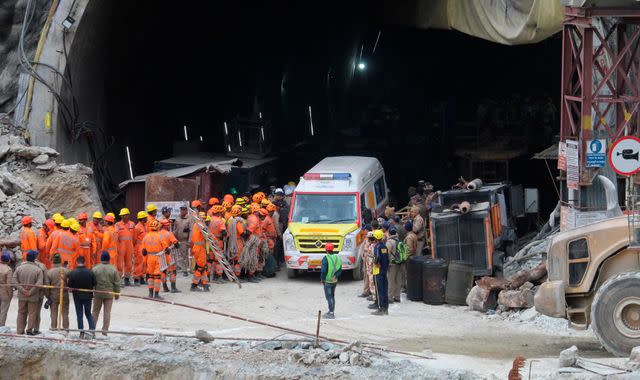India tunnel collapse: Rescuers break through debris trapping 41 workers

A rescue operation to retrieve 41 men trapped in a tunnel in India for more than two weeks is close to a breakthrough, a senior official has said.
Rescuers can hear voices, said Lieutenant General Syed Ata Hasnain.
"We have been involved in this for more than 400 hours and are taking all safety precautions until the end," he told reporters in New Delhi.
It will take three to five minutes to remove each of the labourers, he added.
Sky News journalist Neville Lazarus said there is still two metres of debris to remove and the discovery of iron mesh could delay matters.
The operation to remove the men, once it is properly underway, may take two to three hours, he added.
Earlier, a senior politician said the laying of welded pipes was progressing well.
The workers will "soon be taken out", Pushkar Singh Dhami, the chief minister of Uttarakhand state, said on social media.
They are expected to be pulled out one-by-one on wheeled stretchers through an aperture three feet wide.
Dozens of rescue workers with ropes and ladders are outside the tunnel and ambulances are waiting in a long line.
First aid will be provided on site before the men are taken to a hospital about 19 miles (30km) away.
Last week, a drilling machine broke down, delaying the rescue operation.
But on Monday, so-called rat miners were brought in to drill through the rocks and gravel by hand.
A dozen men were taking turns with hand-held tools, said Kirti Panwar, a state government spokesperson.
They made good progress overnight, officials said earlier.
Rescuers had also started to create a vertical channel to drill down.
Some of the men may develop Post-traumatic Stress Disorder (PTSD), a senior mental health doctor said.
"All 41 would experience some post traumatic symptoms like insomnia, recurrent bad dreams, recurrent reliving of the tunnel collapse, anxiety," said Dr Dinakaran Damodharan from the state-run National Institute of Mental Health and Neurosciences.
"Not everyone will have the disorder but most will suffer from these symptoms for, say, three to six months," he added,
Dr Damodharan said they should be checked for at least a year and may have enduring changes to their personality.
The men have been receiving food, water, light, oxygen and medicines through a pipe.
They had two kilometres of space within the tunnel to walk around in and were encouraged to talk to each other, tell stories, do yoga, take light exercise and play board games sent in to them.
Relatives have been camping near the site, ready to accompany them to hospital.
"As he comes out, my heart will revive again," said the father of one of those who became trapped, Manjeet Chaudhary.
The low-wage workers from India's poorest states have been stuck in the three-mile (4.5km) highway tunnel in Uttarakhand since 12 November.
The structure is part of the £1.2bn Char Dham highway, being built to connect four Hindu pilgrimage sites through a 500-mile network of roads.
While authorities have not said what caused the collapse, there have previously been landslides, earthquakes and floods in the area.


